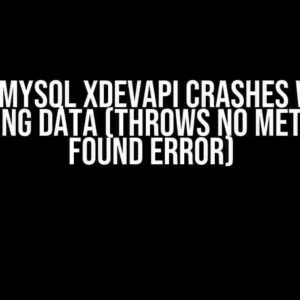Are you tired of tedious file reading and parsing in C++? Do you want to simplify your code and make it more efficient? Look no further! In this article, we’ll dive into the fascinating world of range-based for loops and show you how to effortlessly get lines from a ifstream into strings.
What is a Range-Based For Loop?
A range-based for loop, also known as a for-each loop, is a type of loop introduced in C++11 that allows you to iterate over a range of values without the need for explicit indexing or iterators. It’s a game-changer for working with collections, arrays, and even files!
for (variable : range) {
// do something with variable
}
Why Use Range-Based For Loops with Files?
-range-based for loops offer several benefits when working with files:
- Readability**: Your code becomes more concise and easier to understand.
- Efficiency**: No more manual memory management or iterator juggling!
- Flexibility**: Easily adapt to different file formats and structures.
Getting Started with ifstream and Strings
Before we dive into the juicy stuff, let’s cover the basics:
#include <iostream>
#include <fstream>
#include <string>
int main() {
std::ifstream file("example.txt"); // open a file for reading
std::string line; // declare a string to store each line
The Old Way: Using getline() and while Loops
Traditionally, you’d use a while loop and getline() to read a file line by line:
while (std::getline(file, line)) {
// do something with line
std::cout << line << std::endl;
}
The New Way: Range-Based For Loops with ifstream
Now, let’s upgrade to the range-based for loop approach:
for (std::string line; std::getline(file, line);) {
// do something with line
std::cout << line << std::endl;
}
Notice the subtle difference? We’ve replaced the while loop with a range-based for loop, where the range is defined by the getline() function. This is where the magic happens!
How it Works: Behind the Scenes
Under the hood, the range-based for loop is equivalent to:
{
std::string line;
for (; std::getline(file, line);) {
// do something with line
}
}
The compiler generates an implicit variable, in this case, an empty string `line`, which is used as the loop variable. The `std::getline(file, line)` function becomes the loop condition, and the body of the loop is executed for each iteration.
Range-Based For Loop with Multiple Variables
What if you need to read multiple values per line? No problem! You can declare multiple variables in the initialization part of the range-based for loop:
std::ifstream file("example.csv");
for (std::string name, std::string age; std::getline(file, name, ',') && std::getline(file, age);) {
// do something with name and age
std::cout << name << ", " << age << std::endl;
}
In this example, we’re reading a CSV file with two columns, where each line contains a name and an age. The range-based for loop takes care of reading and parsing the values into separate variables.
Common Pitfalls and Best Practices
To avoid common mistakes and ensure robust file reading, follow these best practices:
- Check for file opening errors**: Verify that the file was successfully opened before attempting to read from it.
- Handle end-of-file (EOF) correctly**: Make sure to check for EOF when reading from the file to avoid infinite loops.
- Be mindful of whitespace and formatting**: Trim or ignore unnecessary whitespace, and consider using a more robust parsing approach for complex file formats.
Error Handling and Exception Safety
When working with files, it’s essential to handle errors and exceptions properly:
try {
std::ifstream file("example.txt");
if (!file.is_open()) {
throw std::runtime_error("Failed to open file");
}
for (std::string line; std::getline(file, line);) {
// do something with line
}
} catch (const std::exception &e) {
std::cerr << "Error: " << e.what() << std::endl;
return 1; // or handle the error accordingly
}
By following these guidelines, you’ll be well on your way to mastering range-based for loops with ifstream and strings.
Conclusion
In this article, we’ve explored the wonders of range-based for loops and how to get lines from a ifstream into strings with ease. By adopting this modern C++ approach, you’ll write more concise, efficient, and readable code. Remember to handle errors and exceptions properly, and you’ll be ready to tackle even the most complex file parsing tasks.
So, the next time you need to read a file in C++, don’t hesitate to give range-based for loops a try. Your code (and your colleagues) will thank you!
| Keyword | Description |
|---|---|
| range-based for loop | A type of loop introduced in C++11 that allows iterating over a range of values without explicit indexing or iterators. |
| ifstream | A file stream that allows reading from a file. |
| getline() | A function that reads a line from a file stream and stores it in a string. |
Happy coding!
Frequently Asked Question
Getting stuck while reading lines from an ifstream into strings in a range-based for loop? Don’t worry, we’ve got you covered!
Why can’t I directly use a range-based for loop to read lines from an ifstream into strings?
That’s because a range-based for loop requires a container with a begin() and end() function, which ifstream doesn’t provide. We need to use a different approach to make it work.
How can I use a range-based for loop to read lines from an ifstream into strings then?
You can use a helper function like `std::istream_iterator
What is the syntax to use std::istream_iterator to read lines from an ifstream?
The syntax is: `std::istream_iterator
How do I use the std::istream_iterator to store lines in a vector of strings?
You can use the syntax: `std::vector
Can I use a range-based for loop to iterate over the vector of strings now?
Yes! You can use a range-based for loop like this: `for (const auto& line : lines) { /* process the line */ }`. This will iterate over each string in the `lines` vector.


